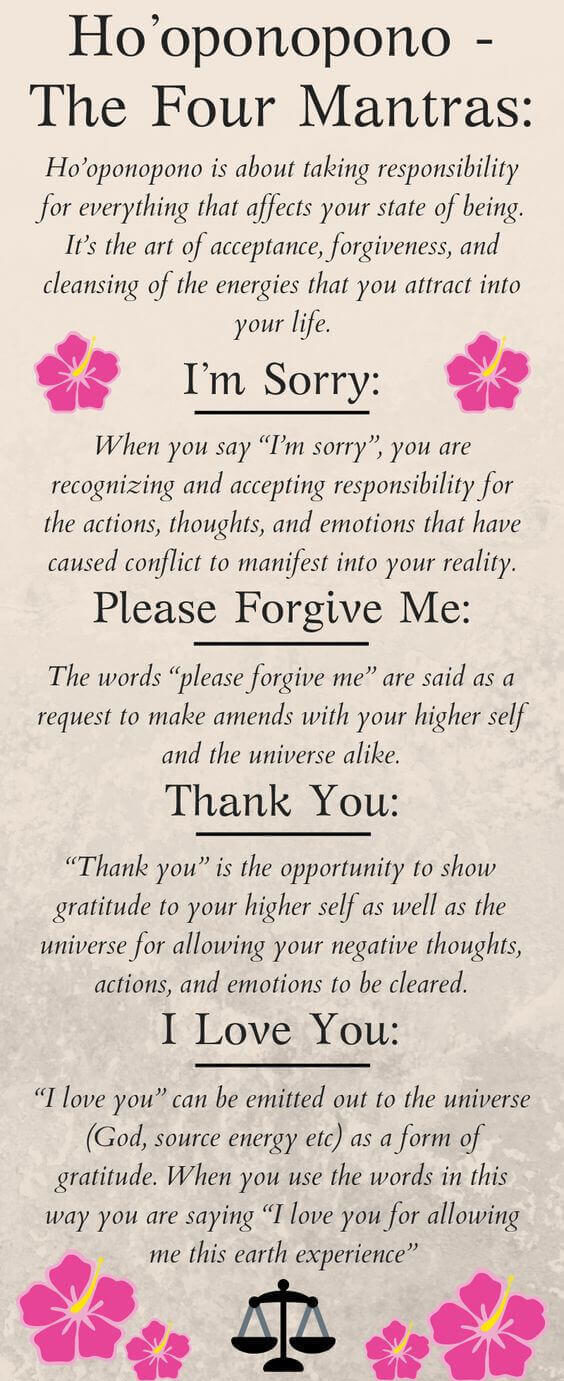I bet you’re wondering what the four phrases used in Ho’oponopono are, right? Well, you’re in luck because I’m here to tell you all about it! Ho’oponopono is a traditional Hawaiian practice that focuses on forgiveness and reconciliation. It is believed that by repeating these four phrases, you can release negative emotions and heal relationships. Curious to know what these phrases are? Keep reading to find out!
If you’re interested in learning more about Ho’oponopono and how it can benefit your life, you’ve come to the right place. In this article, we’ll dive deeper into each of the four phrases used in Ho’oponopono and explore their meanings and significance. Whether you’re seeking to improve your relationships, heal past wounds, or simply find inner peace, understanding and utilizing these powerful phrases can make a profound difference. So, buckle up and get ready to embark on a journey of self-discovery and transformation as we uncover the secrets of Ho’oponopono. Ho’oponopono is an ancient Hawaiian practice that focuses on healing and reconciliation. It is a powerful technique that allows individuals to take responsibility for their actions, seek forgiveness, express gratitude, and cultivate unconditional love. In this article, we will explore the origins and principles of Ho’oponopono, as well as delve into the meaning and purpose of this practice. We will also discuss the four phrases commonly used in Ho’oponopono and their significance in the healing process. So, let’s dive in and discover what the four phrases used in Ho’oponopono are.
Origins and Principles of Ho’oponopono
Ho’oponopono has its roots in the traditional Hawaiian culture. The word Ho’oponopono is derived from two Hawaiian words – “ho’o” meaning “to make” and “pono” meaning “right.” It emphasizes the importance of making things right, restoring balance, and creating harmony.
The practice of Ho’oponopono has been used by Hawaiian elders for centuries to resolve conflicts within families, communities, and even within oneself. It is based on the belief that all problems, whether they are internal or external, are a result of disharmony and imbalance. By addressing and resolving these issues, one can achieve healing and reconciliation.
Meaning and Purpose of Ho’oponopono Practice
The primary purpose of Ho’oponopono is to bring about healing, forgiveness, and reconciliation. It aims to release negative emotions, past traumas, and limiting beliefs. By taking responsibility for our actions, seeking forgiveness, expressing gratitude, and cultivating unconditional love, we can begin the process of healing and transformation.
Ho’oponopono acknowledges that all experiences and relationships are interconnected, and by healing ourselves, we can contribute to the healing of the whole. The practice encourages individuals to recognize their role in creating their reality and to take proactive steps to heal and restore balance in their lives.
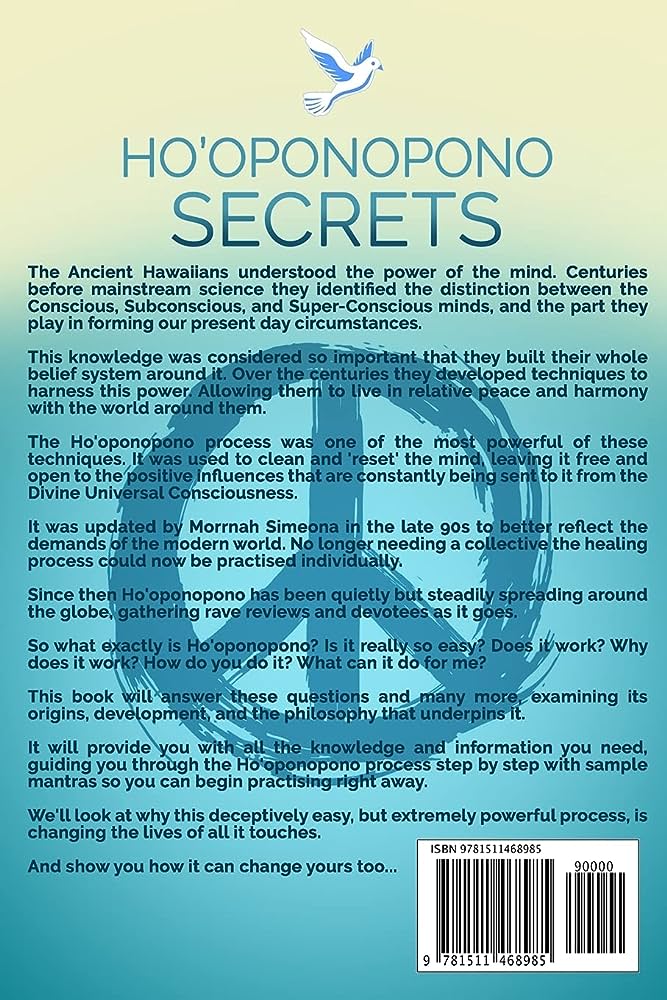
The Four Phrases in Ho’oponopono
The four phrases used in Ho’oponopono are simple yet profound. They are:
I’m Sorry
The phrase “I’m sorry” reflects the acknowledgment of one’s responsibility. It recognizes that our actions, thoughts, and beliefs have contributed to the disharmony and imbalance in our lives. By apologizing, we take ownership of our role in creating negative experiences and open ourselves to healing and reconciliation.
Please Forgive Me
“Please forgive me” is an expression of humility and a sincere request for forgiveness. It acknowledges the pain and hurt caused by our actions and seeks reconciliation with ourselves and others. By seeking forgiveness, we release guilt, resentment, and negative energy, creating space for healing and restoration.
Thank You
Expressing gratitude is a powerful way to shift our focus from negative experiences to positive ones. The phrase “thank you” in Ho’oponopono is an expression of appreciation for the opportunity to heal and grow. It invites abundance and positive energies into our lives, opening doors for new beginnings and possibilities.
I Love You
The phrase “I love you” represents the ultimate expression of unconditional love. It starts with self-love and acceptance, recognizing that we are worthy of forgiveness, healing, and happiness. By cultivating love within ourselves, we can extend that love to others, fostering compassion, understanding, and connection.
Exploring the Phrase ‘I’m Sorry’
The phrase “I’m sorry” in Ho’oponopono goes beyond a mere apology. It signifies taking responsibility for one’s actions, thoughts, and beliefs that have contributed to the disharmony and imbalance in our lives. It requires us to reflect on our behavior and acknowledge the impact it may have had on ourselves and others.
Taking responsibility is an empowering act that allows us to reclaim our power over our experiences. It shifts the focus from blaming external factors to recognizing our own role in creating our reality. By saying “I’m sorry,” we acknowledge that we have the ability to change and create a different outcome.
Furthermore, by saying “I’m sorry,” we acknowledge the need for healing and reconciliation. We recognize that our actions have caused pain and hurt, and we are willing to take steps to mend what is broken. It is through this genuine acknowledgment of our mistakes that we open the door for healing and transformation.
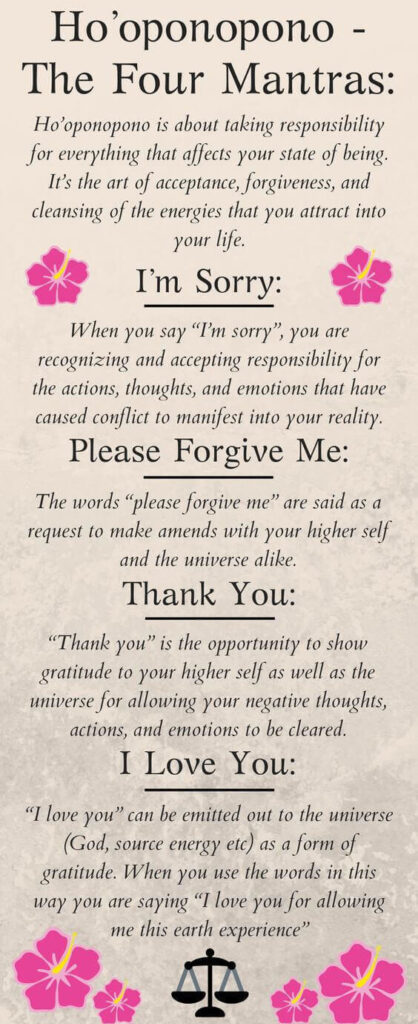
Embracing the Phrase ‘Please Forgive Me’
The phrase “Please forgive me” is a profound expression of humility and a sincere request for forgiveness. It is an acknowledgement of the pain and hurt caused by our actions, thoughts, and beliefs. By seeking forgiveness, we take the necessary steps towards healing emotional wounds and restoring harmony within ourselves and our relationships.
Seeking forgiveness requires vulnerability and a willingness to let go of guilt and resentment. It is a powerful act of self-compassion that allows us to release negative emotions and free ourselves from the burden of the past. By seeking forgiveness, we create space for healing and reconciliation, both within ourselves and with others.
Additionally, when we ask for forgiveness, we acknowledge our imperfections and recognize that we are all human. We understand that making mistakes is a part of the human experience and that forgiveness is essential for growth and transformation. By embracing the phrase “Please forgive me,” we open ourselves to the possibility of healing and creating healthier and more harmonious relationships.
Gratitude and the Phrase ‘Thank You’
Expressing gratitude is a powerful practice that can transform our lives. In Ho’oponopono, the phrase “thank you” is used to express appreciation for the opportunity to heal and grow. It shifts our focus from negative experiences to positive ones, allowing us to invite abundance and positive energies into our lives.
When we say “thank you,” we acknowledge the lessons and growth that have come from our experiences. We recognize that even in challenging times, there are opportunities for personal transformation and self-discovery. By expressing gratitude, we open ourselves to receive more blessings and develop an abundance mindset.
Moreover, gratitude has the power to shift our perspective and cultivate a sense of contentment and inner peace. It helps us focus on the present moment and appreciate the beauty and abundance that surrounds us. By consciously practicing gratitude, we can attract more positive experiences and create a life filled with joy and fulfillment.
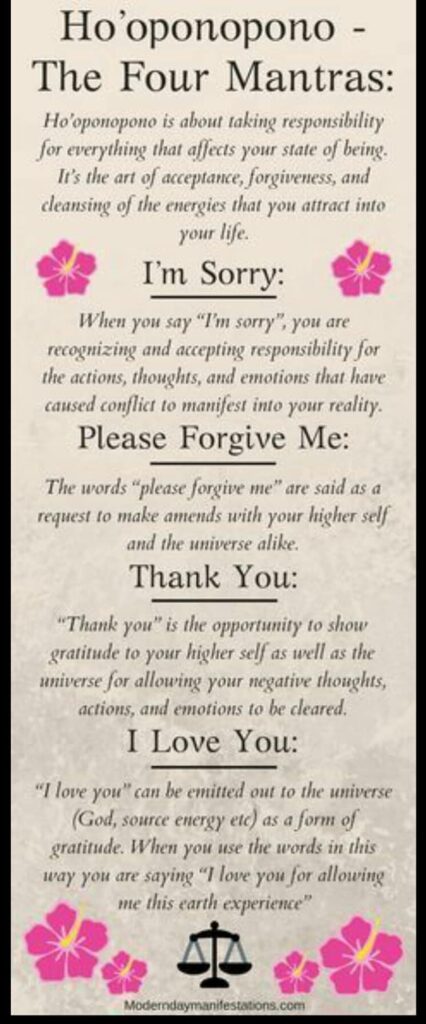
Unconditional Love and the Phrase ‘I Love You’
The phrase “I love you” in Ho’oponopono is an expression of unconditional love. It starts with self-love and acceptance, as we cannot truly love others without first loving ourselves. By fostering self-love, we acknowledge our worthiness of forgiveness, healing, and happiness.
Loving ourselves unconditionally means embracing our flaws, imperfections, and past mistakes. It involves treating ourselves with kindness, compassion, and understanding. By practicing self-love, we cultivate a deep sense of inner peace, contentment, and fulfillment.
Furthermore, the phrase “I love you” extends beyond ourselves to include others. It represents a genuine desire to connect with others on a deeper level and foster compassion and understanding. By cultivating love within ourselves, we are better able to extend that love to others and create harmonious and meaningful relationships.
Applying the Four Phrases in Daily Life
Ho’oponopono is not just a theoretical concept; it is meant to be applied in our daily lives. Here are some practical techniques for incorporating the four phrases into your Ho’oponopono practice:
-
Self-reflection: Take time to reflect on your actions, thoughts, and beliefs. Be honest with yourself and acknowledge any areas where you may have caused harm or contributed to disharmony.
-
Apologize: Say the phrase “I’m sorry” to yourself and visualize it reaching the person or situation you are seeking forgiveness from. Allow yourself to genuinely feel remorse and a desire to make things right.
-
Seek forgiveness: Say the phrase “Please forgive me” to yourself and to others. Visualize a healing energy enveloping you and the other person, creating a space for forgiveness and reconciliation.
-
Express gratitude: Take a moment each day to express gratitude for the opportunity to heal, grow, and connect. Say the phrase “Thank you” and focus on the positive aspects of your life, no matter how small.
-
Cultivate love: Practice self-love and self-care regularly. Say the phrase “I love you” to yourself, embracing all aspects of who you are. Extend love and compassion to others, even in challenging situations.
By consciously integrating these phrases into your daily life, you can create a powerful and transformative Ho’oponopono practice.
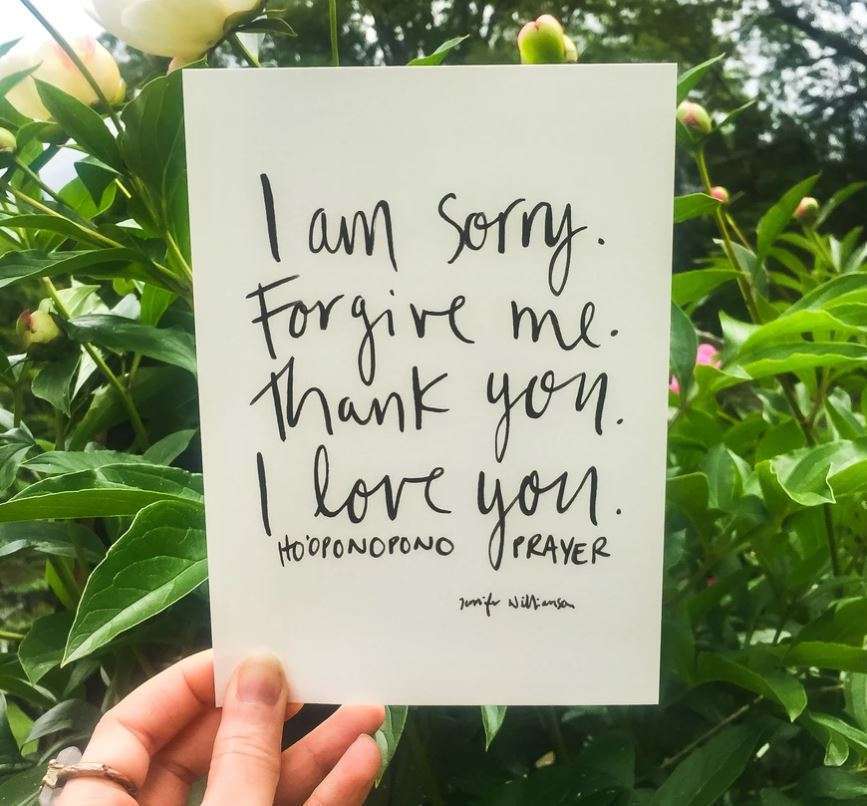
Benefits and Outcomes of Ho’oponopono
The practice of Ho’oponopono can have numerous benefits and outcomes. Here are some of the ways that Ho’oponopono can enhance your well-being:
-
Healing past traumas: Ho’oponopono allows you to release past traumas and negative patterns by taking responsibility for your role in creating them. It provides a safe space for healing, allowing you to let go of emotional baggage and move forward.
-
Enhancing emotional well-being: By practicing Ho’oponopono, you can experience an increased sense of inner peace, contentment, and emotional well-being. The four phrases help you release negative emotions and cultivate positive ones, creating a more balanced and harmonious mindset.
-
Restoring relationships: Ho’oponopono fosters reconciliation and healing within relationships. By taking responsibility for your actions, seeking forgiveness, expressing gratitude, and cultivating unconditional love, you can mend broken relationships and create healthier connections.
-
Creating positive change: The practice of Ho’oponopono empowers you to create positive change in your life. By shifting your focus from blame and resentment to personal responsibility and forgiveness, you can transform your experiences and create a more fulfilling and abundant reality.
Critiques and Misinterpretations of Ho’oponopono
As with any spiritual or self-help practice, Ho’oponopono has faced critiques and misinterpretations. It is essential to address these concerns to gain a deeper understanding of the practice.
Addressing Cultural Appropriation and Commercialization
Ho’oponopono originated from the Hawaiian culture and holds significant cultural and spiritual meaning. In recent years, there have been concerns about cultural appropriation and commercialization of this sacred practice. It is essential to approach Ho’oponopono with respect, reverence, and an understanding of its cultural roots.
It is recommended to learn about Ho’oponopono from authentic sources and teachers who have a deep understanding and connection to the Hawaiian culture. By honoring the origins and principles of Ho’oponopono, we can ensure that we practice it in a respectful and meaningful way.
Understanding the Limitations and Misconceptions of the Practice
Ho’oponopono is a potent practice, but it is important to understand its limitations. While it can bring about healing and transformation, it does not guarantee a specific outcome or solve all problems. Ho’oponopono should be seen as a tool for personal growth and self-reflection rather than a quick fix for all challenges.
Misconceptions about Ho’oponopono include viewing it as a form of manipulation or a way to avoid personal responsibility. It is crucial to approach the practice with sincerity, honesty, and a genuine desire to heal and reconcile. Ho’oponopono works best when it is practiced authentically and from the heart.
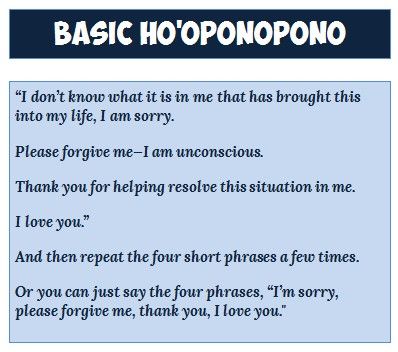
Conclusion
In conclusion, Ho’oponopono is a powerful practice that can bring about healing, reconciliation, and personal transformation. The four phrases used in Ho’oponopono – “I’m sorry,” “Please forgive me,” “Thank you,” and “I love you” – hold profound significance in the healing process. By taking responsibility for our actions, seeking forgiveness, expressing gratitude, and cultivating unconditional love, we can create a more balanced, harmonious, and fulfilling life.
By applying the principles of Ho’oponopono in our daily lives, we can release past traumas, enhance our emotional well-being, and restore relationships. It is important to approach Ho’oponopono with respect, understanding its cultural origins, and practicing it authentically. By doing so, we can harness the power of Ho’oponopono for personal transformation and embrace healing and reconciliation in all aspects of our lives.
So, let’s begin our Ho’oponopono journey by embracing the four phrases with sincerity, compassion, and an open heart.
